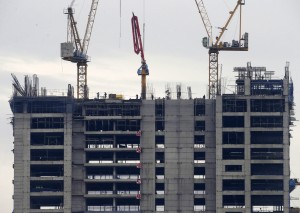Local property sector said to become a $300B industry in the near future
MANILA, Philippines—The Philippine real estate industry has the potential to become a $300-billion industry by 2031, from the $48 billion reported in 2011, but certain structural changes will have to be made, like relaxing stringent rules on foreign ownership and longer lease terms, property consultant and brokerage firm Jones Lang LaSalle said.

Construction of high-rise hotel and condominiums continues in Manila, Philippines and big cities in the country on Thursday May 30, 2013. AP FILE PHOTO
Jones Lang LaSalle country head David Leechiu gave the forecast as he urged the government to build on the Philippines’ economic gains at a time when most large fund managers were hesitant to invest in the country’s real estate sector.
Leechiu said the local real estate sector would experience massive growth over the next 15 years. Developers like Ayala Land Inc. and SM Prime Holdings are allotting billions of dollars in capital spending in 2014 alone to build more shopping malls, homes and hotels.
Still, he said, the Philippines would likely corner a relatively small share of the global pie.
In 2011, the country’s real estate size, estimated at $48 billion, was just 0.2 percent worldwide. In 2031, it is still expected to corner just 0.3 percent. By then, China will account for the bulk of the global pie at $26.4 trillion, followed by India at $5.5 trillion, Jones Lang LaSalle said.
By 2031, Asia-Pacific may account for 48.8 percent, or $44.94 trillion, of the global real estate market, from 27 percent in 2011. This presents an opportunity for growing markets like the Philippines, Leechiu said.
“The sentiment to invest money in real estate is very strong all over the world,” Leechiu said.
This week’s World Economic Forum to be held in Manila, he added, will be a good opportunity to promote investments in the country.
“The Philippines is fundamentally sound, but it can do so much better if it were less restrained,” he said, citing the country’s fast-growing population and emerging middle class.
Coupled with excess liquidity flooding global markets, Leechiu said, “the Philippines has to take advantage of this favorable climate.”
An increase in the foreign ownership cap in corporations, from 40 percent to 50 percent, and increasing the leasehold terms from 50 years (with a 25-year optional renewal) to 80 to 90 years are part of “necessary perquisites” for the country to draw more investments, especially into real estate, Leechiu explained.
He also cited the need to lower corporate taxes which, at 30 percent, made it one of the highest in the region, and to provide “credible and sensible” master planning to attract foreigners.
With property transactions on the road to recovery years after the recent global financial crisis, Leechiu noted that the trend still pointed to further growth.
